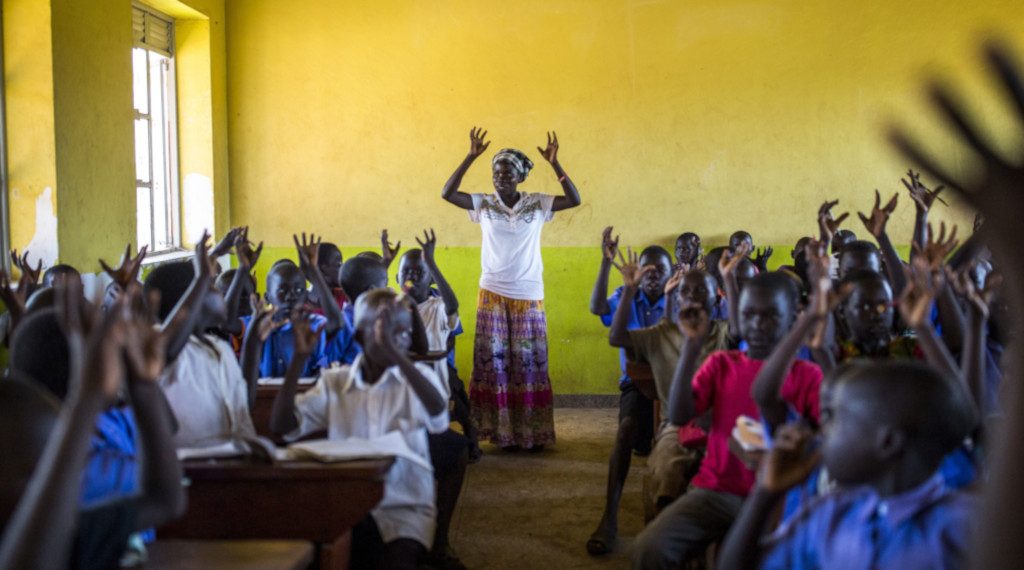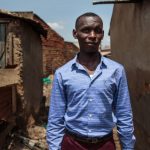
East Africa
In East Africa the volume of FCA’s staff was 226 and the main partners were South Sudan Council of Churches, EU, ECHO, UNHCR and UNICEF.

In East Africa the volume of FCA’s staff was 226 and the main partners were South Sudan Council of Churches, EU, ECHO, UNHCR and UNICEF.

"I grew up in the Katwe slum in Kampala and never went to school as a child. We never had any opportunity for a decent life. I ran away from home when I was 18. When my friends ended up in prison, I realised that we were on the wrong path. I was fortunate enough to be accepted at a training centre in Katwe to study photography”
Muhamud Lwanga, 22,
Uganda
In UGANDA, most of FCA’s work focused on education. The primary schools supported by FCA had a total of 39 970 students while secondary schools had a total of 4 393 students.
FCA is the main cooperation partner of the UN Refugee Agency UNHCR for education in Bidibidi, one of the world’s largest refugee settlements. In addition to the students mentioned above, 1 883 young people in Bidibidi participated in an accelerated learning programme, whereby they caught up with lost years of learning.
Based on the promising beginning, the EU extended the accelerated learning programme funding by two years and the project is expanding to the Kyaka Refugee Settlement in Southwestern Uganda.
Thanks to the additional funding, an unprecedented number of young people, totalling 799, graduated from the popular vocational school in in Rwamwanja refugee settlement in 2018. Of 238 young people who graduated in July, 78% were earning a livelihood by the end of the year through the skills they had learned. This is a significant achievement in Uganda, a country that is wrestling with massive youth unemployment.
A legislative amendment in Finland, which came into force last year, allows the export of Finnish qualifications outside the EU countries. Thus for the first time, an FCA pilot project offered a total of 20 students the opportunity to earn a Finnish micro-entrepreneurship diploma in Uganda. These students graduated in June.
The food situation in SOUTH SUDAN has not improved significantly after the famine of 2017.
Due to the conflict, which escalated in 2016, the price of food has increased tenfold, putting food beyond the reach of the most vulnerable families. FCA provided support in the form of cash aid to a total of 1 945 families, whereby these families were able to obtain food from the markets.
For the recovery of food production, FCA began a project that provides support in the form of training, seeds and equipment to 1 000 farmers and 500 fishermen. At the end of the year, 538 young people began vocational education and training to become construction workers, mechanics, electricians, hairdressers, and hotel industry employees.
The peace agreement ratified in September of 2018 has raised cautious optimism in the country. In particular, FCA has supported the peace dialogues led by women and young people in in the states of Jonglei and Fangak.
In Kenya, FCA’s education project allowed a total of 26 875 students to return to school in Turkana, Garissa, and Marsabit, the poorest counties of the country. The project also trained 360 primary school teachers.
FCA operating areas in Kenya have been plagued by drought in recent years. The water shortage affects children’s education because they often have to walk long distances to fetch water for their families.
FCA improved the availability of pure water for 8 675 citizens, for instance, through water systems built in conjunction with schools.
In SOMALIA, FCA provided support to the government and non-governmental organisations in forming a social, religious and political reconciliation process.
With its work for the strengthening of state structures, FCA has already gained recognition as as a well-known and respected peace builder in Somalia.
In 2018, FCA expanded its operations to education in Baidoa. Through this project supported by the EU and the Ministry for Foreign Affairs of Finland, 4 312 children were able to go to primary school.
A total of 209 students graduated through FCA’s livelihood and entrepreneurship project in Somalia.
In ERITREA, FCA’s work focused on supporting teacher training and a school for the hearing-impaired. Efforts for the development of teacher training continued in close cooperation with the country’s Ministry of Education and the National Commission for Higher Education.
A total of 1 400 students participated in the teacher training programme supported by FCA. Additionally, 130 teacher educators participated in professional training sessions. Seven of them participated in an academic exchange programme in Finland.
At the school for the hearing-impaired, FCA supported the vocational education and training of youth. A total of 35 young people participated, and they are due to become qualified tailors in 2019. Nearly all of the graduates from previous years are employed.
FCA also supported the basic education of hearing-impaired children, for instance, by acquiring books and digital learning devices, such as tablets and laptop computers. Additionally, FCA offered further training to 12 members of staff at the school for the hearing-impaired.
FCA is the only Finnish non-governmental organisation with operations in Eritrea.